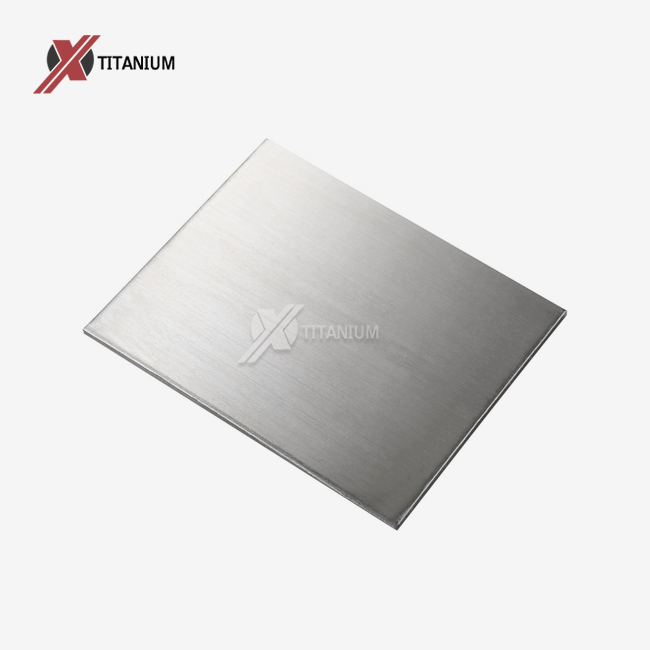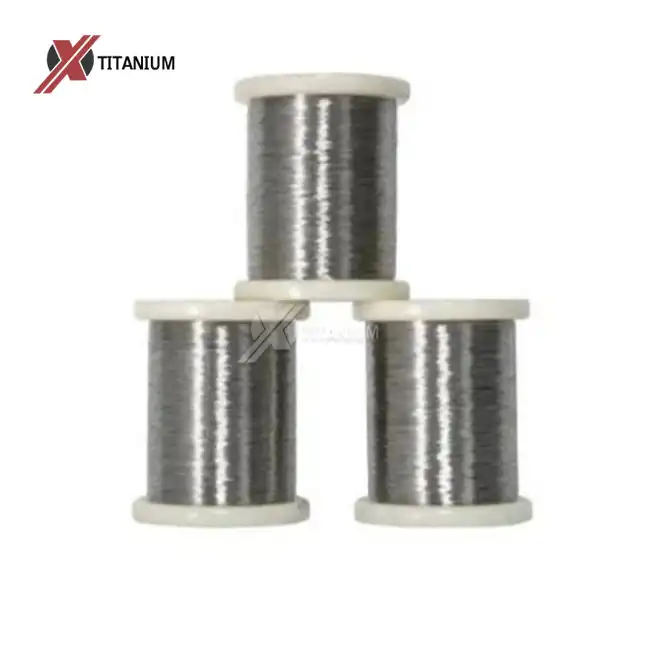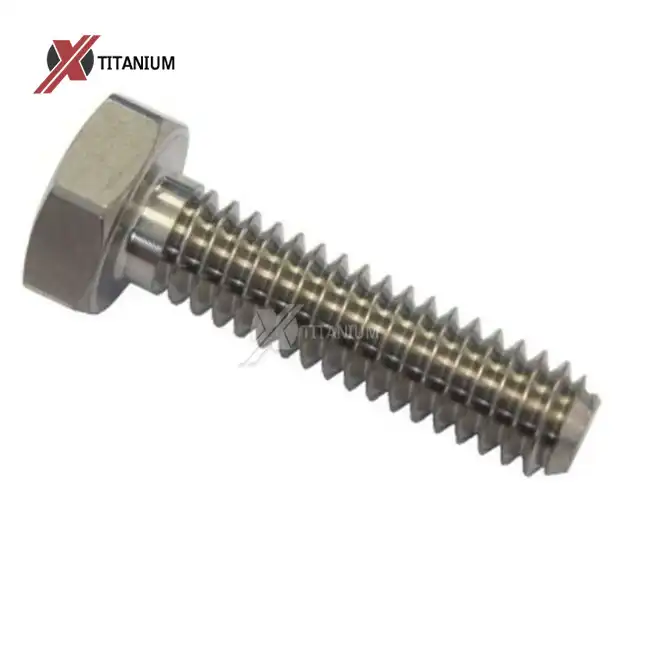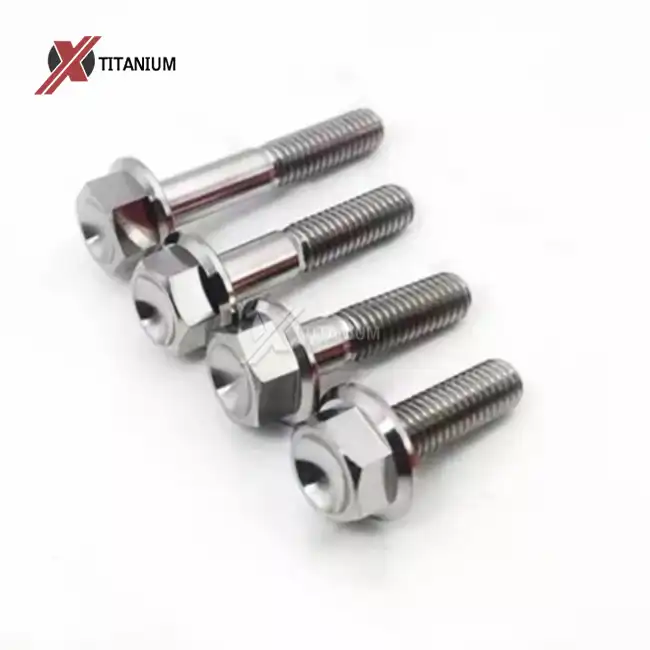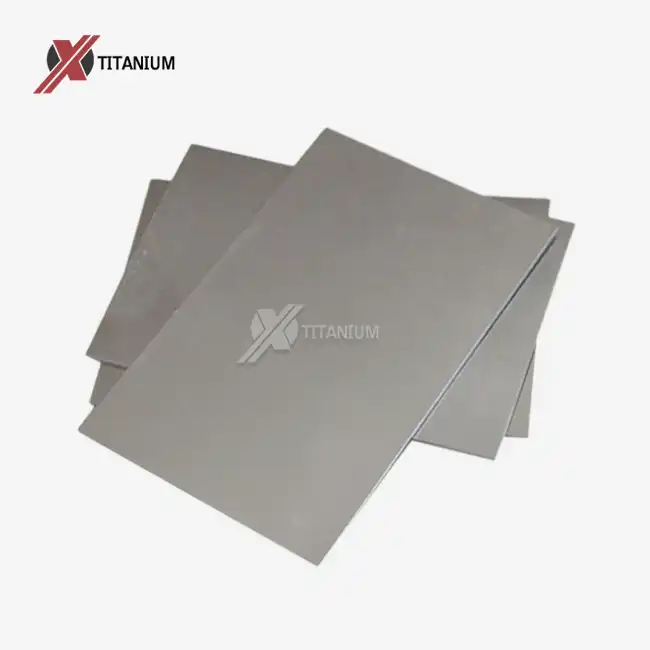The Remarkable Properties of Titanium Alloy Plates
Unparalleled Strength-to-Weight Ratio
Titanium alloy plates boast an exceptional strength-to-weight ratio, surpassing many other metals in this crucial aspect. This property makes them ideal for applications where weight reduction is paramount without compromising structural integrity. In aerospace, for instance, titanium alloy plates contribute to fuel efficiency and improved aircraft performance by reducing overall weight while maintaining robust structural support.
Corrosion Resistance: A Game-Changer in Harsh Environments
One of the most celebrated attributes of titanium alloy plates is their superior corrosion resistance. This characteristic stems from the formation of a stable, protective oxide layer on the surface when exposed to oxygen. As a result, titanium alloy plates can withstand harsh chemical environments, seawater, and other corrosive substances that would quickly degrade other metals. This resistance to corrosion extends the lifespan of components and reduces maintenance costs in various applications, from chemical processing equipment to marine structures.
Biocompatibility: A Boon for Medical Applications
The biocompatibility of certain titanium alloys, particularly Grade 23 (Ti-6Al-4V ELI), has revolutionized the medical industry. Titanium alloy plates are extensively used in orthopedic implants, dental prosthetics, and advanced surgical instruments due to their exceptional strength, corrosion resistance, and low density. The human body’s natural acceptance of titanium minimizes the risk of rejection, allowing implants to integrate seamlessly with living tissue. This makes titanium alloy plates a reliable choice for long-term medical applications, ensuring durability, stability, and patient safety while also advancing innovations in modern healthcare and implant technology.
Industrial Applications: Titanium Alloy Plates as Powerhouses
Aerospace: Reaching New Heights
In the aerospace industry, titanium alloy plates play a crucial role in manufacturing critical components. These plates are widely utilized in producing wing structures, fuselage frames, landing gear parts, and high-performance engine components where strength, heat resistance, and durability are essential. Their exceptional strength-to-weight ratio enables engineers to design lighter yet more robust airframes, reducing overall aircraft weight without compromising safety. This directly improves fuel efficiency, extends flight range, and increases payload capacity. Moreover, titanium’s resistance to extreme temperatures and corrosion ensures long-term reliability, making it indispensable for next-generation aerospace innovation.
Chemical Processing: Withstanding Aggressive Environments
The chemical processing industry relies heavily on titanium alloy plates for their exceptional corrosion resistance. These plates are used in the construction of reactor vessels, heat exchangers, and piping systems that handle aggressive chemicals. The durability of titanium alloy plates in these environments ensures longer equipment life, reduced downtime, and enhanced safety in chemical plants.
Energy Sector: Powering the Future
Titanium alloy plates find extensive use in the energy sector, particularly in renewable energy applications. In offshore wind turbines, these plates are utilized in critical components exposed to harsh marine environments. Solar energy equipment also benefits from the lightweight and corrosion-resistant properties of titanium alloy plates, enhancing the longevity and efficiency of solar panels and supporting structures.
From Industry to Everyday Life: The Versatility of Titanium Alloy Plates
High-Performance Sports Equipment
The sporting goods industry has embraced titanium alloy plates for their exceptional properties. These plates are widely used in manufacturing high-end bicycle frames, golf club heads, tennis racket frames, and other performance-oriented equipment. Their unique combination of strength, rigidity, and lightweight characteristics allows athletes to enhance speed, power, and precision while minimizing fatigue during extended use. Titanium’s durability ensures equipment longevity even under frequent stress and impact, making it a preferred choice for professional athletes and serious enthusiasts who demand high-performance gear that can withstand rigorous training and competitive environments.
Durable Outdoor Gear
Outdoor enthusiasts greatly benefit from the exceptional durability and lightweight nature of titanium alloy plates in camping, hiking, and survival gear. From cookware and tent components to multi-tools and portable stoves, these plates provide rugged strength while keeping gear compact and easy to carry. Titanium’s natural corrosion resistance ensures that equipment withstands exposure to moisture, salt, and extreme environmental conditions. This combination of resilience, longevity, and portability makes titanium-based outdoor gear a reliable and long-lasting companion for adventurers exploring challenging terrains.
Elegant Accessories and Jewelry
In recent years, titanium alloy plates have made their way into the world of fashion and accessories. Jewelry designers appreciate the hypoallergenic properties and unique aesthetic of titanium. Watches, rings, and other accessories crafted from titanium alloy plates offer a modern, sleek look while being incredibly durable and resistant to scratches and tarnishing.
Conclusion
Titanium alloy plates have proven their worth across a spectrum of applications, from industrial powerhouses to elegant accessories. Their unique combination of strength, lightweight properties, and corrosion resistance continues to drive innovation in various sectors. As technology advances, we can expect to see even more creative uses for these versatile materials, further solidifying their position as a cornerstone of modern manufacturing and design. The journey of titanium alloy plates from industrial workhorse to fashionable accessory is a testament to their adaptability and enduring appeal in our ever-evolving world.
If you're interested in exploring the potential of titanium alloy plates for your specific needs, we at Baoji Chuanglian New Metal Material Co., Ltd. are here to help. With over a decade of experience in titanium product manufacturing, we offer expert guidance and high-quality solutions tailored to your requirements. Contact us at info@cltifastener.com or djy6580@aliyun.com to learn more about our titanium alloy plate options and how they can benefit your projects.
FAQ
What makes titanium alloy plates unique compared to other metal plates?
Titanium alloy plates stand out due to their exceptional strength-to-weight ratio, superior corrosion resistance, and biocompatibility. These properties make them ideal for a wide range of applications, from aerospace to medical devices.
Are titanium alloy plates expensive?
While initially more costly than some other metals, the long-term benefits of titanium alloy plates, such as durability and reduced maintenance, often make them a cost-effective choice in many applications.
Can titanium alloy plates be recycled?
Yes, titanium alloy plates are recyclable, which contributes to their sustainability and long-term value in various industries.
References
1. Smith, J. R. (2021). "Titanium Alloys in Aerospace: A Comprehensive Review." Journal of Aerospace Engineering, 34(2), 145-160.
2. Chen, Q., & Thouas, G. A. (2015). "Metallic implant biomaterials." Materials Science and Engineering: R: Reports, 87, 1-57.
3. Williams, D. F. (2008). "On the mechanisms of biocompatibility." Biomaterials, 29(20), 2941-2953.
4. Lutjering, G., & Williams, J. C. (2007). "Titanium (Engineering Materials and Processes)." Springer Science & Business Media.
5. Peters, M., Kumpfert, J., Ward, C. H., & Leyens, C. (2003). "Titanium alloys for aerospace applications." Advanced Engineering Materials, 5(6), 419-427.
